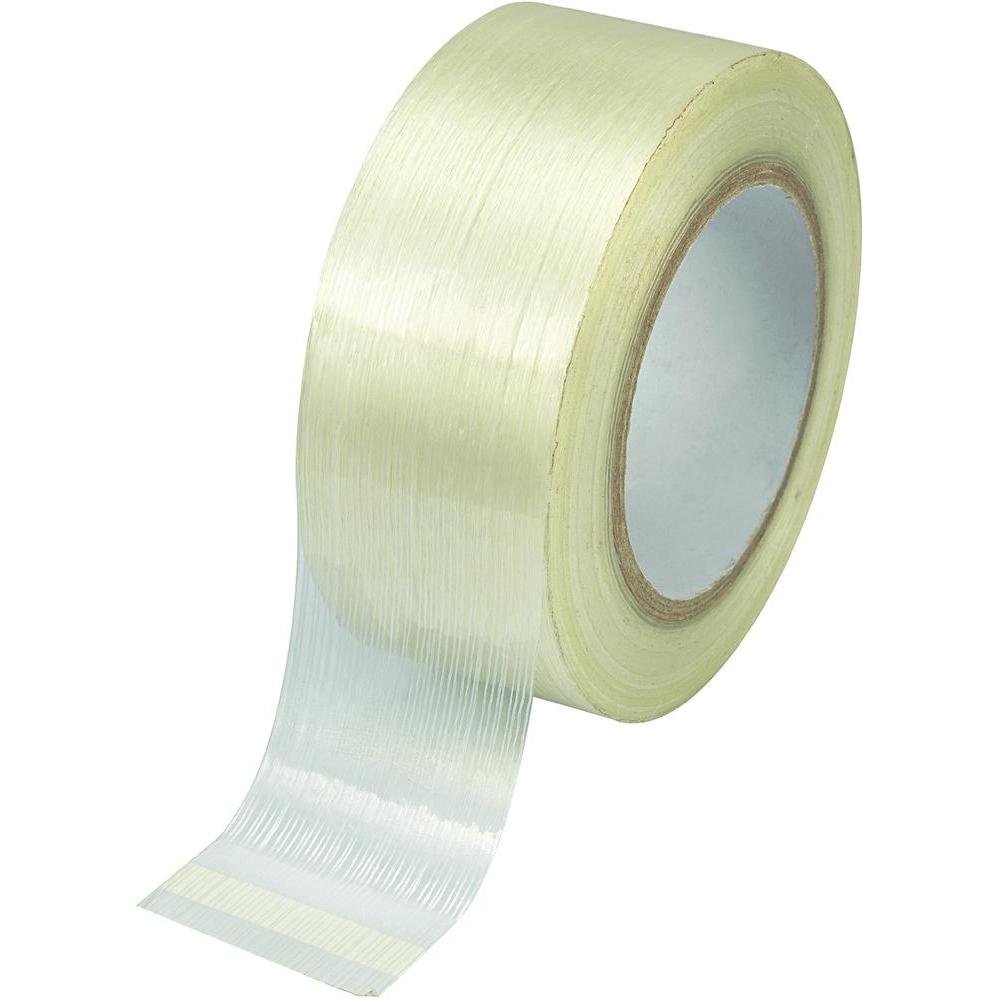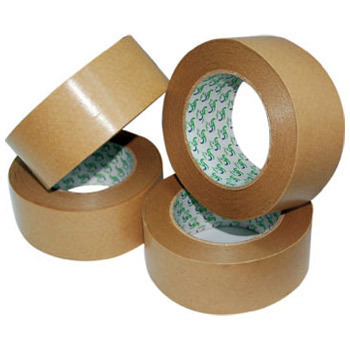

Tape can be recycled as long as it is made out of paper, which unfortunately excludes many of the most popular types of adhesive tape. However, that doesn't mean you can't put tape in the recycling bin at all — depending on the type of tape and your local recycling center's requirements, it is sometimes OK to recycle materials like cardboard and paper with tape still attached. Learn more about recyclable tape, other environmentally friendly alternatives, and ways to avoid tape waste.
Recyclable Adhesive Tape
There are a few recyclable or biodegradable tape options that are made from a combination of paper and natural adhesive rather than plastic.
Gummed paper tape, also known as water-activated tape (WAT), is usually made of a paper material and a water-based chemical adhesive. You may be familiar with this type of tape and not even know it — it is often used by large online retailers.
As its name suggests, WAT needs to be activated using water, much like an old postage stamp. It comes in large rolls that must be placed in a custom dispenser in charge of moistening the adhesive surface to make it bond (though a few retailers also offer a home version that you can moisten with a sponge). After use, gummed paper tape will remove cleanly or tear and will not leave sticky residue on the box.
There are two types of WAT: non-reinforced and reinforced. The former is used for shipping and packaging lighter objects. The stronger variety, reinforced WAT, has embedded fiberglass strands that make it harder to tear and can stand heavier loads. The paper on reinforced WAT is still recyclable, but the fiberglass component is filtered out during the recycling process.
Self-adhesive kraft paper tape, another recyclable option, is also made of paper but uses a natural rubber-based bonding agent. Like WAT, it is available in standard and reinforced versions, but does not require a custom dispenser.
If using any of these paper-based products, they can just be added to your normal curbside recycling bin. Keep in mind that small pieces of tape, just like small pieces of paper and shredded paper, may not be recyclable because they may ball up and damage the equipment. Instead of removing tape from boxes and attempting to recycle it on its own, leave it attached for easier recycling.
Biodegradable Tape
New technology is also opening the door to biodegradable and more eco-friendly options. Cellulose tape is already available in some markets, and a 2013 study developed an innovative self-adhesive tape made with plant starch as a carrier.1 According to researchers, applications for the new product include commercial adhesives as well as medical tape and biomedical electrodes, and the material fully biodegraded after 42 days in soil tests.
What to Do With Tape on Packaging
Most of the tape that gets discarded is already stuck to something else, like a cardboard box or a piece of paper. The recycling process filters out tape, labels, staples, and similar materials, so a reasonable amount of tape typically runs through the process completely fine. However, in these cases, there's a catch. The plastic tape is filtered out and dumped in the process, so while it can go in the recycling bin in most cities, it does not get recycled into new material.
Often, too much tape on the box or piece of paper can cause sticky clogs in the recycling machinery. Depending on the recycling center’s equipment, even too much paper-backed tape like masking tape can cause the entire package to be thrown out rather than risk clogging the machinery. San Francisco, for example, requests that any and all tape be removed from cardboard boxes, while the city of Napa, located just over an hour north, requests that you remove as much tape as possible.
Plastic Tape
Traditional plastic adhesive tapes are not recyclable. These plastic tapes can contain PVC or polypropylene, which on their own could be recycled with other plastic films, but are too thin and small to be separated and processed as tape. Plastic tape dispensers are also hard to recycle — and therefore not accepted by most recycling centers — since facilities aren’t equipped to sort them.
"Greener" Tape
As new sustainable technologies develop, alternatives to plastic adhesive tape are becoming more common. For example, though not recyclable, Scotch Tape makes a “green” alternative to its original invisible Scotch Magic Tape, made from 65% recycled or plant-based material with refillable holders.
Painter's Tape and Masking Tape
Painter's tape and masking tape are very similar and are often made with a crepe paper or polymer film backing. The main difference is the adhesive, typically a synthetic latex-based material. Painter's tape has a lower tack and is designed to remove cleanly, while the rubber adhesive used in masking tape may leave a sticky residue. These tapes are generally not recyclable unless specifically stated in their packaging.
Duct Tape
It's no secret that duct tape is a reuser’s best friend. There are so many items in your home and your backyard that can be repaired with a quick application of duct tape, rather than buying a whole new product. Duct tape is made of three main raw materials: the adhesive, the fabric reinforcement (scrim), and polyethylene (backing). Although polyethylene on its own could be recycled with similar #2 plastic films, it is impossible to isolate once combined with the other components. Therefore, duct tape isn't recyclable either.
Ways to Reduce Tape Usage
Most of us find ourselves reaching for the tape when packing boxes, sending mail, or wrapping gifts. Try these tips to reduce your tape usage, so you won’t have to worry about recycling it at all.
Moving
Get creative and swap out cardboard boxes with suitcases, baskets, or tote bags. Better yet, see if reusable moving boxes are available for rent in your area. If you must use cardboard boxes for moving, opt for tapeless boxes with locking lids.
Shipping
Tape is almost always overused when packing and shipping. Before you go to seal that package, ask yourself if you really need to wrap it up so tightly. There are plenty of eco-friendly options available to replace traditional packing material as well, from self-seal paper mailers to compostable mail bags.
Gift Wrap
For holidays, opt for one of the many tape-free wrapping options, such as furoshiki (the Japanese cloth folding technique which allows you to wrap objects with fabric), reusable bags, or one of the many eco-friendly alternatives to wrapping paper that don't require adhesives.







